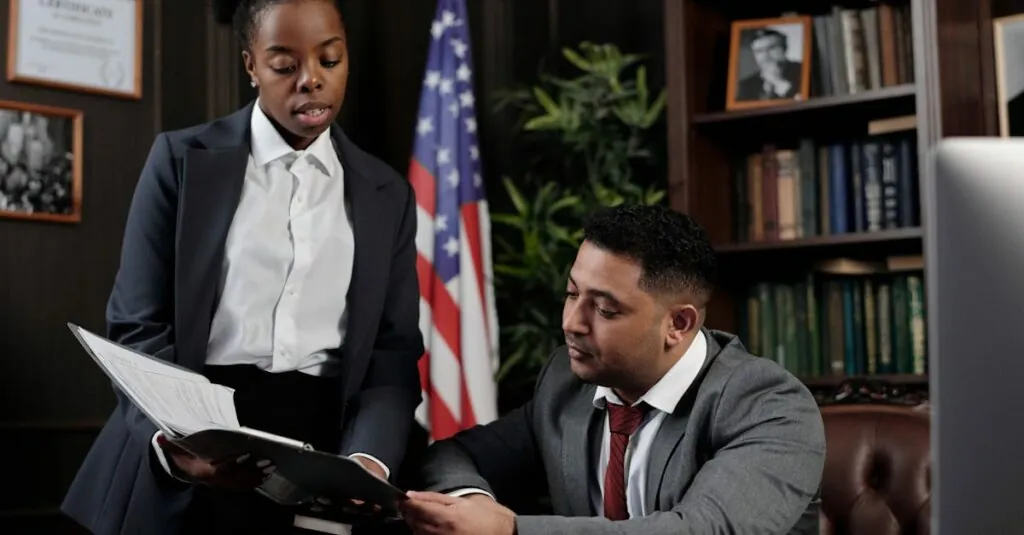In a world where even the most mundane actions can spark international incidents, diplomatic immunity stands as a shield for those representing their countries abroad. Imagine a world where your neighbor’s cat has more legal protection than your average tourist—sounds absurd, right? Yet, this quirky aspect of international law often leads to fascinating debates and eyebrow-raising scenarios.
A diplomatic immunity review isn’t just a dry legal exercise; it’s a peek behind the curtain at how countries navigate the delicate dance of diplomacy. From the amusing tales of diplomats getting away with minor infractions to serious discussions about accountability, this topic is both enlightening and entertaining. Buckle up as we explore the ins and outs of diplomatic immunity, where the stakes are high, and the consequences can be downright hilarious.
Table of Contents
ToggleUnderstanding Diplomatic Immunity
Diplomatic immunity serves as a vital safeguard for diplomats, allowing them to perform their duties without fear of legal repercussions. This legal protection ensures that diplomats can focus on diplomacy rather than legal troubles.
Historical Context
Historically, diplomatic immunity traces back to ancient civilizations, where envoys enjoyed privileges to maintain peaceful relations. Ancient Greece and Rome established early practices that recognized the importance of protecting representatives. The Vienna Convention of 1961 solidified these privileges in modern law, providing comprehensive guidelines. Over the decades, various countries embraced this framework, though interpretations and applications may differ. Significant cases throughout history underscore the complexities and debates surrounding diplomatic immunity’s limits.
Legal Framework
The legal framework of diplomatic immunity centers on international treaties and national laws defining protections. The Vienna Convention on Diplomatic Relations remains the cornerstone of the legal structure, outlining the rights and duties of diplomats. Under this convention, diplomats enjoy immunity from prosecution and civil suits while engaging in official duties. Specific provisions exist for family members, ensuring they, too, receive similar protections. National legislation often complements international agreements, establishing additional guidelines for enforcement and potential exceptions. These legal instruments shape how diplomatic immunity functions in practice, balancing protection with accountability.
Types of Diplomatic Immunity
Diplomatic immunity encompasses various forms, primarily categorized into full immunity and limited immunity. Each type serves distinct purposes in international relations.
Full Immunity
Full immunity provides comprehensive protection to diplomats while they perform official duties. It ensures they cannot face prosecution or civil suits within the host country. This form of immunity extends to embassy staff and their families, safeguarding them from legal actions that may arise in the line of duty. Full immunity originates from principles outlined in the Vienna Convention, which emphasizes that diplomats must operate free from interference. This level of protection fosters open communication between nations, promoting diplomacy and cooperation.
Limited Immunity
Limited immunity applies to specific situations, offering protections that do not extend as broadly as full immunity. This type usually covers activities directly related to official functions, excluding personal actions. For example, diplomats may face legal consequences for actions unrelated to their diplomatic roles, such as engaging in criminal activity. Limited immunity establishes a balance between protecting diplomatic missions and holding individuals accountable for unlawful behavior. This framework supports the idea that while diplomats require certain protections, they must still adhere to the laws of the host country when off-duty.
Implications of Diplomatic Immunity
Diplomatic immunity affects various aspects of international relations and domestic law enforcement. Understanding these implications highlights the complexities faced by states in balancing legal protections with accountability.
International Relations
International relations heavily rely on the principles of diplomatic immunity. Treaties like the Vienna Convention of 1961 ensure diplomats can engage freely without the fear of legal repercussions. This guarantee fosters open dialogue and cooperation between nations. Challenges arise, however, when diplomatic immunity is perceived as a shield for misconduct. Diplomats have sometimes exploited this immunity to evade justice, creating tensions between host and sending states. Instances of diplomats avoiding prosecution for serious crimes can damage bilateral relations. Countries strive to manage these situations delicately, aiming to uphold diplomatic norms while addressing public concerns.
Domestic Law Enforcement
Domestic law enforcement faces unique challenges due to diplomatic immunity. Diplomats enjoy protection from arrest and prosecution, complicating the enforcement of local laws. Police often lack authority to detain diplomats for minor infractions, which can frustrate citizens and law enforcement officials alike. When a diplomat commits a crime, authorities typically must navigate diplomatic protocols to address the issue. Some nations seek to negotiate waivers of immunity for serious offenses, allowing for accountability. Host countries maintain an interest in effective enforcement while respecting diplomatic privileges. Balancing these responsibilities remains critical for fostering trust and maintaining the rule of law within international interactions.
Challenges and Controversies
Diplomatic immunity faces several challenges and controversies, sparking debates around its implications and efficacy. Concerns arise primarily from potential abuses of this privilege.
Abuse of Diplomatic Immunity
Abuses occur when diplomats exploit their immunity to evade justice. Instances include serious offenses such as driving under the influence or even violent crimes, where offenders escape accountability. For example, a 2019 case revealed a diplomat in the U.S. implicated in a hit-and-run incident yet remained uncharged due to immunity. Law enforcement officials struggle to address these situations, as diplomatic protections complicate prosecutions and civil actions. International relations suffer when host countries see diplomats escape consequences for wrongdoing, leading to distrust and frustration.
Calls for Reform
Reform advocates push for reevaluating the privileges associated with diplomatic immunity. Many argue for clearer definitions and boundaries, ensuring accountability for diplomats who commit serious offenses. In 2021, numerous countries proposed amendments to the Vienna Convention to address these concerns, suggesting potential restrictions on immunity for egregious crimes. Public sentiment increasingly reflects a desire for transparency in diplomatic accountability, pressuring governments to strike a balance between protection and justice. Adapting the current framework may minimize exploitation and reinforce international trust while maintaining the necessary protections for diplomatic operations.
Diplomatic immunity remains a crucial aspect of international relations but its complexities cannot be overlooked. While it fosters cooperation and dialogue between nations, the potential for abuse raises significant concerns. Instances of diplomats evading justice for serious offenses highlight the urgent need for reform.
As discussions around accountability gain momentum, the balance between protecting diplomatic functions and ensuring justice is more important than ever. Adapting existing frameworks will not only enhance transparency but also reinforce trust among nations. The future of diplomatic immunity hinges on finding a solution that respects both the privileges of diplomats and the rights of host countries.




